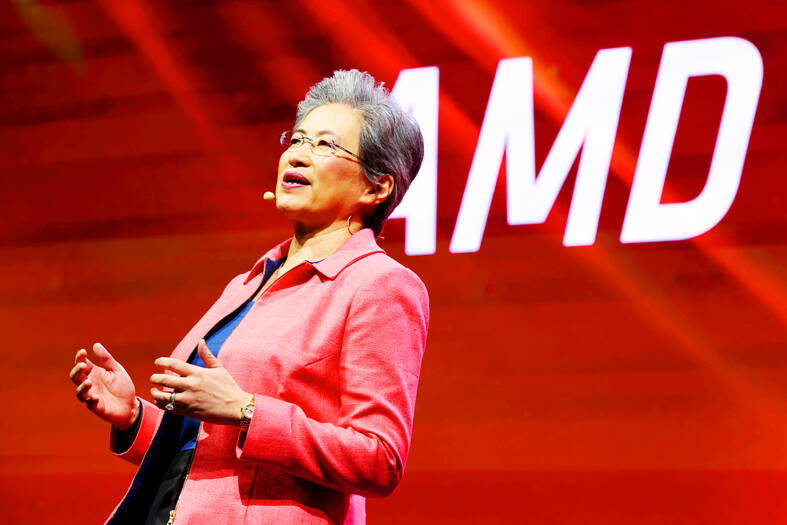Advanced Micro Devices Inc (AMD) has chosen to locate its new research-and-development (R&D) centers in Tainan and Kaohsiung, as part of the US chip company's NT$8.64 billion (US$270.5 million) project to advance its development of cutting-edge technologies such as artificial intelligence (AI) and silicon photonics, the Ministry of Economic Affairs said yesterday.
AMD’s latest investment would help to develop Taiwan into an “AI silicon island,” the ministry said in a statement after Minister of Economic Affairs J.W. Kuo (郭智輝) met AMD representatives led by David Wang (王啟尚), senior vice president of AMD’s graphics processing unit technologies and engineering, in Taipei yesterday.
AMD did not comment on why it chose two sites rather than one. Tainan is the birthplace of AMD chief executive officer Lisa Su (蘇姿丰) and is a major manufacturing hub of Taiwan Semiconductor Manufacturing Co’s (TSMC, 台積電) 3-nanometer chips for AI devices. In Kaohsiung, TSMC is building a new fab to produce next-generation 2-nanometer chips.

Photo: Ritchie B. Tongo, EPA-EFE
AMD is the latest in a series of global semiconductor companies seeking to build their R&D centers in Taiwan under the ministry’s A+ global R&D and innovation partnership program. The US chip company last month was granted a subsidy of NT$3.31 billion, about 38 percent of the company’s investment over three years.
AMD’s decision came as Taiwan has formed an extensive supply chain to provide components for the world’s AI devices, from AI chips made by TSMC to AI servers assembled by Hon Hai Precision Industry Co (鴻海精密), Quanta Computer Inc (廣達) and Wiwynn Corp (緯穎).
AI chip giant Nvidia Corp has set up its first AI R&D center in Taipei’s Neihu District (內湖) and is scouting sites for a second, likely in Kaohsiung.
Semiconductor equipment makers ASML Holding NV, Lam Research Corp and Applied Materials Inc previously also received grants to set up local R&D sites through the same program, the ministry said.
Kaohsiung has been working diligently to expand the local talent pool in collaboration with the nation’s prestigious schools. At the beginning of this year, National Tsing Hua University signed a memorandum of understanding with the Kaohsiung City Government to establish a branch in the city, following a similar agreement with National Yang Ming Chiao Tung University.
Based on details previously disclosed by the ministry, about 33 Taiwanese companies would take part in AMD’s R&D program, which would help to train more than 10,000 AI professionals each year for three years.

GROWING OWINGS: While Luxembourg and China swapped the top three spots, the US continued to be the largest exposure for Taiwan for the 41st consecutive quarter The US remained the largest debtor nation to Taiwan’s banking sector for the 41st consecutive quarter at the end of September, after local banks’ exposure to the US market rose more than 2 percent from three months earlier, the central bank said. Exposure to the US increased to US$198.896 billion, up US$4.026 billion, or 2.07 percent, from US$194.87 billion in the previous quarter, data released by the central bank showed on Friday. Of the increase, about US$1.4 billion came from banks’ investments in securitized products and interbank loans in the US, while another US$2.6 billion stemmed from trust assets, including mutual funds,

Micron Memory Taiwan Co (台灣美光), a subsidiary of US memorychip maker Micron Technology Inc, has been granted a NT$4.7 billion (US$149.5 million) subsidy under the Ministry of Economic Affairs A+ Corporate Innovation and R&D Enhancement program, the ministry said yesterday. The US memorychip maker’s program aims to back the development of high-performance and high-bandwidth memory chips with a total budget of NT$11.75 billion, the ministry said. Aside from the government funding, Micron is to inject the remaining investment of NT$7.06 billion as the company applied to participate the government’s Global Innovation Partnership Program to deepen technology cooperation, a ministry official told the

Taiwan Semiconductor Manufacturing Co (TSMC, 台積電), the world’s leading advanced chipmaker, officially began volume production of its 2-nanometer chips in the fourth quarter of this year, according to a recent update on the company’s Web site. The low-key announcement confirms that TSMC, the go-to chipmaker for artificial intelligence (AI) hardware providers Nvidia Corp and iPhone maker Apple Inc, met its original roadmap for the next-generation technology. Production is currently centered at Fab 22 in Kaohsiung, utilizing the company’s first-generation nanosheet transistor technology. The new architecture achieves “full-node strides in performance and power consumption,” TSMC said. The company described the 2nm process as

JOINT EFFORTS: MediaTek would partner with Denso to develop custom chips to support the car-part specialist company’s driver-assist systems in an expanding market MediaTek Inc (聯發科), the world’s largest mobile phone chip designer, yesterday said it is working closely with Japan’s Denso Corp to build a custom automotive system-on-chip (SoC) solution tailored for advanced driver-assistance systems and cockpit systems, adding another customer to its new application-specific IC (ASIC) business. This effort merges Denso’s automotive-grade safety expertise and deep vehicle integration with MediaTek’s technologies cultivated through the development of Media- Tek’s Dimensity AX, leveraging efficient, high-performance SoCs and artificial intelligence (AI) capabilities to offer a scalable, production-ready platform for next-generation driver assistance, the company said in a statement yesterday. “Through this collaboration, we are bringing two